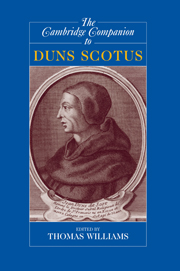Book contents
- Frontmatter
- Introduction
- 1 Scotus on Metaphysics
- 2 Space and Time
- 3 Universals and Individuation
- 4 Duns Scotus’s Modal Theory
- 5 Duns Scotus’s Philosophy of Language
- 6 Duns Scotus on Natural Theology
- 7 Duns Scotus on Natural and Supernatural Knowledge of God
- 8 Philosophy of Mind
- 9 Cognition
- 10 Scotus’s Theory of Natural Law
- 11 From Metaethics to Action Theory
- 12 Rethinking Moral Dispositions
- Bibliography
- Citations of works attributed to John Duns Scotus
- Index
7 - Duns Scotus on Natural and Supernatural Knowledge of God
Published online by Cambridge University Press: 28 May 2006
- Frontmatter
- Introduction
- 1 Scotus on Metaphysics
- 2 Space and Time
- 3 Universals and Individuation
- 4 Duns Scotus’s Modal Theory
- 5 Duns Scotus’s Philosophy of Language
- 6 Duns Scotus on Natural Theology
- 7 Duns Scotus on Natural and Supernatural Knowledge of God
- 8 Philosophy of Mind
- 9 Cognition
- 10 Scotus’s Theory of Natural Law
- 11 From Metaethics to Action Theory
- 12 Rethinking Moral Dispositions
- Bibliography
- Citations of works attributed to John Duns Scotus
- Index
Summary
The Earnest Professor begins the lecture by announcing that today we are going to investigate what we can know about God. The Artless Student immediately asks how it is possible that we finite minds can comprehend anything about the infinite. The Professor groans inwardly, resisting the temptation to retort by asking how the finite mind of the Student is so certain that God is infinite, given the Student’s avowal of doubt about the adequacy of finite minds.
Eager to maintain classroom civility, the Professor might congratulate the Student on fastening on a question discussed at length by John Duns Scotus. It is a sign of the seriousness with which Scotus takes this and related issues that he tackles them immediately in the Ordinatio version of his monumental Commentary on the Sentences of Peter Lombard. The title of the first question in the Prologue to the First Part is “Whether It Is Necessary for Man in His Present State to Be Supernaturally Inspired with Some Doctrine.” The title of the first question of the First Part of the Third Distinction is “Whether God Is Naturally Knowable to the Wayfarer’s Intellect.” God’s existence is not at stake in these questions. Scotus thinks that God’s existence can be established as an item of natural theology, that part of theological speculation that can be developed by reason alone, independent of any kind of revelation. Scotus takes himself to be in agreement with Aristotle that human sense experience and natural reason are adequate to provide a demonstration of God’s existence.
- Type
- Chapter
- Information
- The Cambridge Companion to Duns Scotus , pp. 238 - 262Publisher: Cambridge University PressPrint publication year: 2002
- 1
- Cited by



